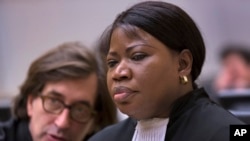DAKAR, SENEGAL —
Senegal was the first country in the world to ratify the Rome Statute – the treaty establishing the International Criminal Court (ICC) - that in 1998 gave court the power to prosecute individuals for international crimes such as genocide.
Today, the Netherlands-based court has come under fire from some critics for its record of only going after African leaders.
In fact, since the ICC officially entered into force in 2002, every target of prosecution has been an African leader.
About 60 Senegalese law students, along with activists from the country and experts from the Netherlands, gathered recently at the Dutch embassy in Dakar to discuss the ICC's strengths and shortcomings.
Eight African countries have come under investigation and eight non-African countries have investigations pending.
Cheikh Fall, a Dakar cyber-activist and journalist familiar with international law, said every investigation has focused on Africa, and there is a good reason for that.
Why are African leaders tried by the ICC?
“Countries say that ICC judges (prosecute) only African countries,” said Fall. “Yes, okay. But often, when you take stock, you realize that most of the genocides and war crimes are committed in these countries.”
Fall added a focus should be made on strengthening democratic institutions in these countries, to make sure these crimes don't occur in the first place.
“There is maybe a democratic effort that must be made in Africa, and consolidated in these countries, to allow Africa to put itself in a position to prevent having to drag our leaders to this court.”
He also said the seminar touched on how Africans can take more of the reigns at the ICC level by becoming more involved as lawyers and judges.
Fatou Bensouda from Gambia is the current prosecutor at the ICC.
Dutch Ambassador Pieter Jan Kleiweg De Zwaan said he knows there are some public opinions that the ICC is a court founded where “Europeans judge Africans,” but approximately half of the cases have been brought to the attention of the court by Africans. He says instead, the court is a place where those who have committed human rights crimes and have not been judged in their own country will meet justice.
During the seminar, the Senegalese community was asked to weigh in via social media with their thoughts.
Many said the ICC had no credibility with them – whether because of its sole prosecution of Africans or the fact that countries such as Israel and the United States are not parties to the treaty.
Today, the Netherlands-based court has come under fire from some critics for its record of only going after African leaders.
In fact, since the ICC officially entered into force in 2002, every target of prosecution has been an African leader.
About 60 Senegalese law students, along with activists from the country and experts from the Netherlands, gathered recently at the Dutch embassy in Dakar to discuss the ICC's strengths and shortcomings.
Eight African countries have come under investigation and eight non-African countries have investigations pending.
Cheikh Fall, a Dakar cyber-activist and journalist familiar with international law, said every investigation has focused on Africa, and there is a good reason for that.
Why are African leaders tried by the ICC?
“Countries say that ICC judges (prosecute) only African countries,” said Fall. “Yes, okay. But often, when you take stock, you realize that most of the genocides and war crimes are committed in these countries.”
Fall added a focus should be made on strengthening democratic institutions in these countries
“There is maybe a democratic effort that must be made in Africa, and consolidated in these countries, to allow Africa to put itself in a position to prevent having to drag our leaders to this court.”
He also said the seminar touched on how Africans can take more of the reigns at the ICC level by becoming more involved as lawyers and judges.
Fatou Bensouda from Gambia is the current prosecutor at the ICC.
Dutch Ambassador Pieter Jan Kleiweg De Zwaan said he knows there are some public opinions that the ICC is a court founded where “Europeans judge Africans,” but approximately half of the cases have been brought to the attention of the court by Africans. He says instead, the court is a place where those who have committed human rights crimes and have not been judged in their own country will meet justice.
During the seminar, the Senegalese community was asked to weigh in via social media with their thoughts.
Many said the ICC had no credibility with them – whether because of its sole prosecution of Africans or the fact that countries such as Israel and the United States are not parties to the treaty.




